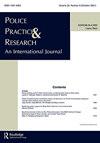“烫手山芋?:法医科学和技术在凶杀案调查中的挑战
IF 1.8
Q2 CRIMINOLOGY & PENOLOGY
引用次数: 1
摘要
一段时间以来,人们一直观察到凶杀案调查所面临的挑战。尽管今天的警察可以用几十年前无法想象的方式收集证据,但法医科学技术(FST)的使用给现代凶杀调查带来了挑战和后果。虽然“数字足迹”越来越多地出现在法庭诉讼中,但提供和分析FST数据的任务落在了面临资源短缺和其他挑战的警方身上。我们调查了艾伯塔省的凶杀案调查员,以检查他们对FST的看法以及FST对他们工作的影响。与会者透露,数据量大、缺乏专业知识和资源限制导致对FST及其产生的需求感到沮丧。与此同时,大多数与会者指出,通过平民化手段,技术可以为凶杀(和其他)调查提供充分的优势。本文章由计算机程序翻译,如有差异,请以英文原文为准。
‘Poisoned Chalice?’: the challenges of forensic science and technology for homicide investigations
ABSTRACT The challenges accompanying the investigation of homicide have been observed for some time. Although police today can gather evidence in ways not imagined decades ago, the use of forensic science and technology (FST) have created challenges and consequences for modern-day homicide investigations. While ‘digital footprints’ are increasingly expected in court proceedings, the provision of and analysis of FST data falls to the police who face resource shortages and other challenges. We surveyed homicide investigators across Alberta to examine their perceptions of FST and the implications of FST for their work. Participants revealed that data volume, lack of expertise and resource constraints result in frustration with FST and the demands it creates. At the same time, most participants pointed to civilianization as the means through which technology can provide full advantage to homicide (and other) investigations.
求助全文
通过发布文献求助,成功后即可免费获取论文全文。
去求助
来源期刊

Police Practice and Research
CRIMINOLOGY & PENOLOGY-
CiteScore
4.10
自引率
5.60%
发文量
50
期刊介绍:
Police Practice and Research is a peer-reviewed journal that presents current and innovative police research as well as operational and administrative practices from around the world. Articles and reports are sought from practitioners, researchers and others interested in developments in policing, analysis of public order, and the state of safety as it affects the quality of life everywhere. Police Practice and Research seeks to bridge the gap in knowledge that exists regarding who the police are, what they do, and how they maintain order, administer laws, and serve their communities. Attention will also be focused on specific organizational information about the police in different countries or regions. There will be periodic special issues devoted to a particular country or continent.
 求助内容:
求助内容: 应助结果提醒方式:
应助结果提醒方式:


